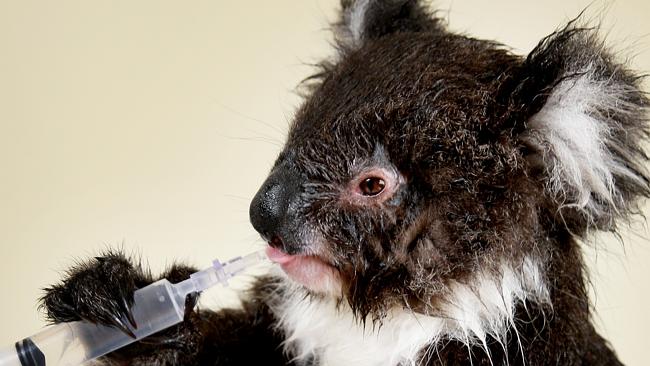Australia had the 15th hottest summer since records began in 1910, and 2013 was the hottest year on record. The southern city of Adelaide, experienced 13 days of higher than 40 degrees C temperatures. This might be great news for sun worshipers but it is not good for the native koala.

Picture: Mike Burton Source: News Limited
The extreme heat caused several koalas to be admitted into animal hospitals across the east of the country. In just one week at the beginning on January, 23 koalas were admitted into the Adelaide Wildlife and Koala Hospital. The marsupials were suffering with heat stress and dehydration. Some were so dehydrated that they were put on drips. Unfortunately, not all survived; two had to be put down due to renal failure. Luckily, most survived and once rehydrated we returned to the wild.
Koalas live in eucalypt woodlands and forests and are make their homes across a vast swath of Australia from south-eastern South Australia to Queensland. They do not normally drink water because they usually get sufficient water by licking dew from leaves. It is rare that a koala will leave its perch safe up in the trees. Spotting a koala at ground level is a sign of a heat stressed animal.
One koala was so thirsty that it followed a couple along suburban roads near Adelaide, drinking three bottles of water along the way. As featured on adelaidenow.com.au, Mr and Mrs Sun were walking near the Black Hill Conservation Park entrance when Mr Sun spotted the koala in a tree.

“She kept looking at me and looked like she wanted something, so I poured some water in my palm, and the koala drank it at once,” said Mrs Sun.
“She followed me for an hour and ended up drinking three bottles altogether – definitely the friendliest koala I’ve ever seen.”
Australian residents were urged to leave containers of water out for koalas and other wildlife to drink during hot weather. In an article on koalaland.com, Koala carer Susannah Keogh from Lismore’s Friends of the Koala Care Centre, said the lack of rain and drying winds had thinned eucalypt canopies, meaning more koalas were on the hunt for water.
“Normally most of a koala’s water intake comes from the leaves it eats,” Ms Keogh said.
“They get quickly dehydrated, which can lead to illness and even death. Leaving out containers of water for your local koalas and other wildlife can literally save their lives.”
Forest fires are common during the searing hot Australian summers. Bush fires cause a loss of vital habitat for koalas and other wildlife, as well as endangering humans. At the beginning of the year, grassfires on the Fraser Coast took out around a quarter of the Police Paddock Conservation Park leaving resident koalas with a lack of food.
There are many organisations campaigning for koala conservation. This vulnerable creature deserves to survive but climate change is anticipated to bring more hot summers and more misery to the koala population in Australia.
